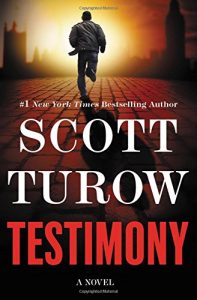 Give Me the Child by Mel McGrath
Give Me the Child by Mel McGrath
Published by HQ
The Pinocchio Brief by Abi Silver
Published by Lightning
Testimony by Scott Turow
Published by Mantle UK, Grand Central US
The Late Show by Michael Connelly
Published by Little Brown
The reason this column is so late is because much of my reading time was taken up with preparation for the Theakston Old Peculier Crime Writing Festival in Harrogate, which took place last weekend. One of the audience said enthusiastically, ‘This really is the A team,’ as she took in the galaxy of starry writers around her. My own panel, which looked at the way crime writers so often foretell real events, consisted of Chris Brookmyre, Eva Dolan, Kati Hiekkapelto, and Sarah Lotz. All very intelligent, as well as thoughtful and highly articulate, they made my job of chairing the discussion pure pleasure. The preparation was fun too, not least because all of them have given their main characters engaging personalities.
They’re not necessarily the embodiment of goodness. No one could call Chris Brookmyre’s Jack Parlabane a spotless hero, but he is good to spend time with, as is his sidekick in Want You Gone, an entrancing computer hacker known as Buzzkill.
Mel McGrath has removed some of my prejudice against the currently over-fashionable is-she-mad-or-is-her-husband-a-psychopath? subgenre by creating a woman of intelligence and grit instead of the familiar moaning drip. Dr Cat Lupo, the heroine of Give Me the Child , is a psychologist, who suffered post-partum psychosis after her first child was born and is therefore considered likely to ‘go mad’ by anyone who disagrees with her or finds her challenging. Faced with trouble at work, she is also expected to take in her husband’s illegitimate daughter, who may or may not have had  something to do with her own mother’s death. The fast-paced novel is enlivened not only by Cat, but also by some interesting research into the neurological and psychological causes of violence.
something to do with her own mother’s death. The fast-paced novel is enlivened not only by Cat, but also by some interesting research into the neurological and psychological causes of violence.
Abi Silver’s first novel, The Pinocchio Brief, also deals with an interesting topic in the forthcoming digitization of justice. Pinocchio is the name of a computer program designed to assess whether or not defendants and witnesses are lying. Neither of the women lawyers involved in the case of an autistic 15-year-old boy accused of murder is particularly appealing, and the boy himself is hard to like. But the main problem with this first novel is that it needed more stringent editing. I have only the proof here, and so more work may have been done on the finished copy, but this includes too much unnecessary detail, too little pace, poorly organized changes in viewpoint, far too  many clichés, and sentences such as, ‘The precocious square of parkland opposite was empty of sentient life, apart from a squirrel tearing around the undergrowth, its tail flailing wildly, stopping in freeze-frame from time to time, before drilling down to disturb the foundations of the splayed and fading tulips.’
many clichés, and sentences such as, ‘The precocious square of parkland opposite was empty of sentient life, apart from a squirrel tearing around the undergrowth, its tail flailing wildly, stopping in freeze-frame from time to time, before drilling down to disturb the foundations of the splayed and fading tulips.’
Scott Turow, another lawyer, is a more experienced and much better  writer. In Testimony he sends Illinois lawyer Bill ten Boom to the Hague as a prosecutor at the International Criminal Court. His first case involves establishing the truth about one of the many atrocities of the Bosnian war, which ended ten years ago. Four hundred Roma are alleged to have been massacred in a cave that still contains their bodies.
writer. In Testimony he sends Illinois lawyer Bill ten Boom to the Hague as a prosecutor at the International Criminal Court. His first case involves establishing the truth about one of the many atrocities of the Bosnian war, which ended ten years ago. Four hundred Roma are alleged to have been massacred in a cave that still contains their bodies.
The challenges Boom faces are immense and the legal and moral questions raised by the case are interesting, but he is not an attractive man. His speciality is self-pity. He blames his late parents for not telling their children that they were Dutch Jews, who escaped death in the Holocaust by fleeing to America. He blames his adult sons for their anger at the way he divorced their mother and broke up the family. And he is so undiscriminating in his choice of sexual partners that he puts not only his emotional stability but also his professional life at risk by sleeping with a woman involved in the case.
Just like Rusty Sabitch, the lawyer-hero of Turow’s first and best novel, Presumed Innocent, Boom presents this woman as a wicked temptress, who plans to sleep her way to the achievement of her personal goals. His own idiocy in succumbing to her wiles is described much more leniently. Once it’s all gone wrong, he isn’t left lonely for long. Along with his self-pity is his more or less  miraculous ability to appeal to any woman on whom his fancy might light.
miraculous ability to appeal to any woman on whom his fancy might light.
Michael Connelly is a writer of great warmth, as fans of his Harry Bosch novels know. In The Late Show he offers readers a much more sympathetic woman in Renee Ballard, a detective in Hollywood. Her tragic backstory includes a rejecting mother, a dead father, and betrayal by her most trusted colleague. She brought a sexual harassment case against a senior officer and lost it because her partner lied. Since then she has been consigned to night duty, consoling herself with paddle-boarding, her affection for her grandmother and for a rescue dog, and sex with a willing and undemanding probation officer.
One night’s duty sees her involved in dealing with an assault on a transsexual prostitute and a night-club shooting. Both cases pull her into dangerous territory and she soon finds herself stripped naked, tied to a psychopath’s chair and threatened with rape before she dies. This, along with the sexual harassment case in her past, suggests that the most interesting thing about a woman and her greatest vulnerability is her sex. It isn’t. A woman’s greatest vulnerability, like a man’s, is the possibility of losing her life.
I haven’t read all of the Harry Bosch novels and so I don’t know whether he was ever stripped naked and threatened with sexual violence. I wish I had time to find out. Few people reading today’s crime fiction – and news stories – would realize that statistically men are more at risk of violence than women. As one publisher told her author: ‘Dead men don’t sell books; dead women do.’ I look forward to the day when this changes.
